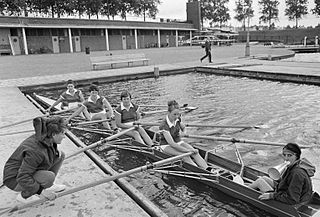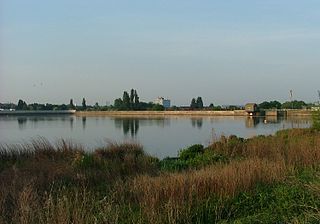The 1961 European Rowing Championships were rowing championships held on the Vltava (Moldau) in the Czechoslovakian capital Prague. The event for women was held from 18 to 20 August, and 9 countries competed with 32 boats. The event for men was held from 24 to 27 August, and 20 countries entered boats. Men competed in all seven Olympic boat classes, and just three countries entered boats in all classes: the hosts Czechoslovakia, the Soviet Union, and a combined German team. Women entered in five boat classes. The regatta was held in five lanes, with rowers proceeding in the direction of the river's flow.

The 1962 European Rowing Championships were rowing championships held on the Langer See in the East Berlin suburb of Grünau in East Germany; the venue had previously been used for the 1936 Summer Olympics. This edition of the European Rowing Championships was for women only and was held from 17 to 19 August. Eleven countries contested five boat classes. Men would three weeks later meet in Lucerne for the inaugural World Rowing Championships.

The 1964 European Rowing Championships were rowing championships held on the Bosbaan regatta course in the Dutch capital Amsterdam. Women competed from 31 July to 2 August. Men competed the following week from 6 to 9 August. Men competed in all seven Olympic boat classes, and women entered in five boat classes. Many of the men competed two months later at the Olympic Games in Tokyo; women would first be allowed to compete at Olympic level in 1976.

The 1965 European Rowing Championships were rowing championships held on the Wedau regatta course in the West German city of Duisburg. This edition of the European Rowing Championships was held from 20 to 22 August for women, and from 26 to 29 August for men. Women entered in five boat classes, and 12 countries sent 36 boats. Men competed in all seven Olympic boat classes, and 22 countries sent 89 boats. East German crews did not attend the championships.

The 1966 European Rowing Championships were rowing championships held on the Bosbaan in the Dutch city of Amsterdam; the venue had previously been used for the 1954 and 1964 European Rowing Championships. This edition of the European Rowing Championships was for women only and was held from 26 to 28 August. Thirteen countries contested five boat classes, and 39 teams were competing. Two weeks later, men would meet in Bled, Yugoslavia, at the second edition of the World Rowing Championships.

The 1967 European Rowing Championships were rowing championships held on Lake Allier, a reservoir in the Allier River adjacent to the French city of Vichy. This edition of the European Rowing Championships was held from 1 to 3 September for women, and from 7 to 10 September for men. Women entered in five boat classes, and 14 countries sent 40 boats. For the first time, a women's team from outside Europe attended the championships, with the USA sending two boats. Men competed in all seven Olympic boat classes, and 24 or 25 countries sent 113 boats. Three non-European countries sent some (male) rowers: the United States, Australia, and New Zealand.

The 1968 European Rowing Championships were rowing championships held on the Grünau Regatta Course in the East Berlin suburb of Grünau. This edition of the European Rowing Championships was for women only and was held from 16 to 18 August. Twelve or fifteen countries contested five boat classes, and 39 teams competed. Despite the European label of the event, it was open to any country and was regarded as unofficial world championships, but all contesting countries in 1968 were from Europe. The men would meet in Mexico City in mid-October at the 1968 Summer Olympics.
The 1969 European Rowing Championships were rowing championships held on the Wörthersee in the Austrian city of Klagenfurt. This edition of the European Rowing Championships was held from 5 to 7 September for women, and a few days later for men. Women entered in five boat classes, and 15 countries—including the United States—sent 47 boats. Men competed in all seven Olympic boat classes. An innovation was that petite finals were held to determine places 7 to 12.
The 1970 European Rowing Championships were rowing championships held on Lake Öreg in Tata, Hungary. There were five competitions for women only ; the events for men were contested two weeks later at the 1970 World Rowing Championships in St. Catharines, Canada, instead. As World Rowing Championships were still held at four-year intervals at the time, the European Rowing Championships were open to nations outside of Europe and had become to be regarded as quasi-world championships.
Alena Postlová was a Czechoslovakian rower. She won the 1962 European Rowing Championships in single sculls. She competed at European Rowing Championships between 1959 and 1970 in single and double sculls. At the 1963 European Rowing Championships in Moscow, she capsized in the final.

The 1960 European Rowing Championships were rowing championships held on the Welsh Harp Reservoir in the London suburb of Willesden in England. This edition of the European Rowing Championships was for women only and was held from 12 to 14 August. Twelve countries contested five boat classes. Men would compete later that month in Italy for the 1960 Summer Olympics.
The 1958 European Rowing Championships were rowing championships held on Lake Malta in the city of Poznań in Poland. Men competed in all seven Olympic boat classes, and women entered in five boat classes.
The 1959 European Rowing Championships were rowing championships held on the Mâcon regatta course on the Saône in Mâcon, France. The event for women was held from 14 to 16 August, and 16 races were held. The event for men was held from 20 to 23 August. Men competed in all seven Olympic boat classes, and women entered in five boat classes.
The 1957 European Rowing Championships were rowing championships held on the Wedau Regatta Course in the city of Duisburg which, at the time, was located in West Germany. Men competed in all seven Olympic boat classes, and women entered in five boat classes. Many of the men competed two months later at the Olympic Games in Melbourne; women would first be allowed to compete at Olympic level in 1976. Women competed from 23 to 25 August. Men competed the following week.
The 1956 European Rowing Championships were rowing championships held on Lake Bled in the city of Bled which, at the time, was located in Yugoslavia. Men competed in all seven Olympic boat classes, and women entered in five boat classes. Many of the men competed two months later at the Olympic Games in Melbourne; women would first be allowed to compete at Olympic level in 1976.

The 1954 European Rowing Championships were rowing championships held on the Bosbaan regatta course in the Dutch city of Amsterdam. This edition is particularly notable for the fact that it was the first time that women were allowed to compete as part of the championships, after three years of trial regattas for them. Women from 13 countries were represented with 34 boats, and they competed in five boat classes from 20 to 22 August. The men competed in all seven Olympic boat classes a week later, from 26 to 29 August. It would be another 22 years until women would first be allowed to compete at Olympic level in 1976.
The 1963 European Rowing Championships for men were rowing championships held on Lake Bagsværd near the Danish capital Copenhagen; the competition for women was held the following month in Moscow. The regatta in Copenhagen was held from 14 to 18 August.

The 1955 European Rowing Championships for women were rowing championships held in the Romanian capital city of Bucharest from 4 to 7 August. The competition for men was held later in the month in Ghent. The women competed in five boat classes.
The 1953 European Rowing Championships were rowing championships held on Lake Bagsværd near the Danish capital Copenhagen. Men competed in all seven Olympic boat classes. The regatta was also the third test event for international women's rowing organised by the International Rowing Federation (FISA), with nine countries competing in four boat classes over the shorter race distance of 1,000 m. The purpose of the test event was to see whether women's rowing should formally become part of the FISA-organised European Rowing Championships.
Barbara Müller, is a rower who represented East Germany in the 1960s. She was later a rowing coach for SG Dynamo Potsdam.








